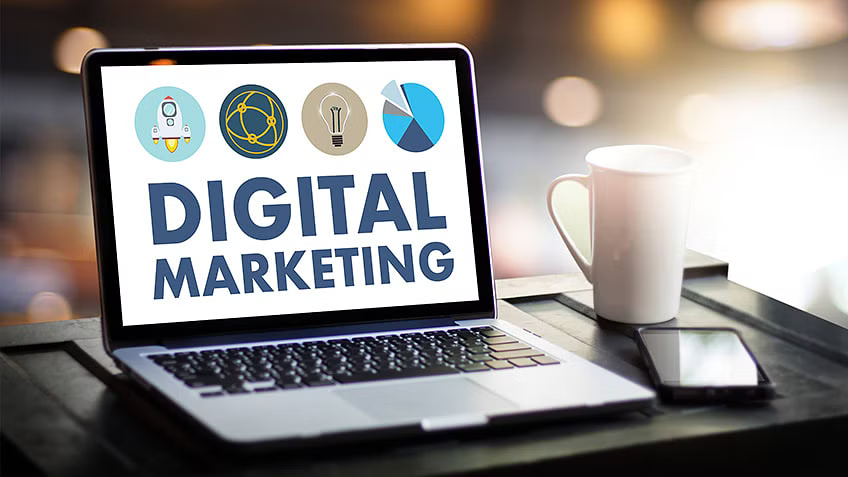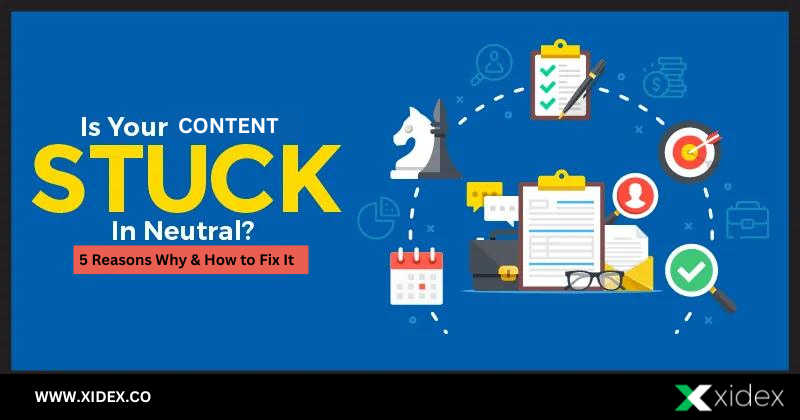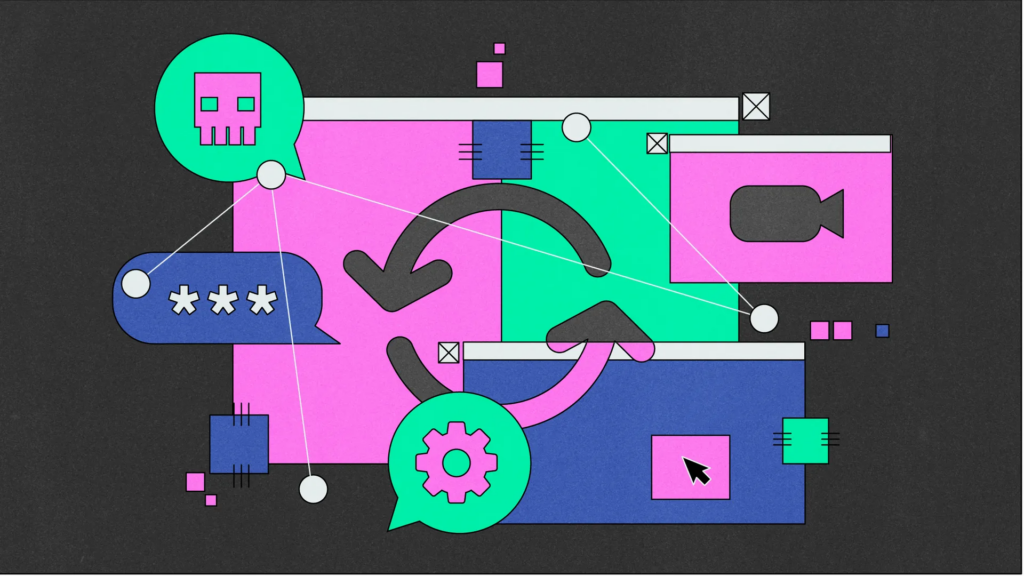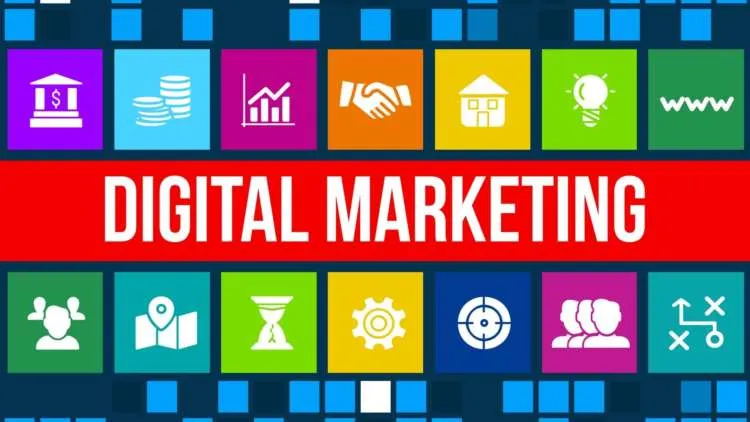Digital marketing is the practice of promoting products or services through digital channels, such as search engines, social media, email, and mobile apps. The goal of digital marketing is to reach and engage with a targeted audience online, with the aim of driving traffic, generating leads, increasing sales, and building brand awareness.
Digital marketing encompasses a wide range of strategies and tactics, including search engine optimization (SEO), pay-per-click (PPC) advertising, social media marketing, email marketing, content marketing, influencer marketing, and more. Each of these tactics has its own set of best practices and requires a different approach depending on the audience and the goals of the campaign.
Digital marketing has become increasingly important in today’s digital age, as more and more consumers turn to the internet to research products and make purchasing decisions. Businesses that can effectively leverage digital marketing strategies are better positioned to reach their target audience and drive growth.
Inbound marketing versus digital marketing
Inbound marketing and digital marketing are two different approaches to promoting products or services online, but they are often used together to create a comprehensive online marketing strategy.
Digital marketing refers to any type of marketing that uses digital channels to reach and engage with customers, such as email, social media, search engines, and mobile apps. This includes both inbound and outbound marketing tactics. Digital marketing is a broad term that encompasses a wide range of strategies and tactics.
Inbound marketing is a subset of digital marketing that focuses on creating valuable content and experiences that attract potential customers to a brand’s website or social media channels. The goal of inbound marketing is to build trust and authority with potential customers by providing them with helpful information and resources, rather than pushing them to make a purchase. Inbound marketing tactics include content marketing, search engine optimization (SEO), social media marketing, and email marketing.
The key difference between inbound marketing and digital marketing is that inbound marketing focuses on building relationships with potential customers through valuable content, while digital marketing includes both inbound and outbound marketing tactics to promote a brand’s products or services online. While both approaches are important for a comprehensive online marketing strategy, inbound marketing can be particularly effective at building long-term relationships with potential customers and generating sustainable growth for a brand.

Why is digital marketing important?
Digital marketing is important for businesses for several reasons:
- Wide reach: The internet has a global reach, allowing businesses to target audiences from all over the world. Digital marketing allows businesses to reach a wider audience than traditional marketing methods.
- Cost-effective: Digital marketing is often more cost-effective than traditional marketing methods. It allows businesses to create targeted campaigns, reach a wider audience, and track the results of their campaigns in real-time.
- Measurable results: Digital marketing campaigns can be tracked and measured in real-time, allowing businesses to see the effectiveness of their campaigns and make changes to optimize their results.
- Targeted audience: Digital marketing allows businesses to target specific audiences based on demographics, interests, and behavior. This ensures that marketing efforts are focused on the people who are most likely to be interested in the product or service being offered.
- Increased engagement: Digital marketing provides businesses with a range of tools to engage with their audience, such as social media, email marketing, and content marketing. This increased engagement can lead to more loyal customers and increased brand awareness.
- Competitive advantage: Digital marketing is becoming increasingly important for businesses to remain competitive in today’s digital age. Businesses that can effectively leverage digital marketing strategies are better positioned to reach their target audience and drive growth.
digital marketing is important for businesses because it provides a cost-effective, measurable, and targeted way to reach and engage with their audience
B2B versus B2C digital marketing
B2B (business-to-business) and B2C (business-to-consumer) digital marketing differ in their target audiences, goals, strategies, and tactics.
B2B digital marketing targets other businesses as its primary audience, and the goal is to build relationships and generate leads that can lead to business deals. B2B marketing often involves long sales cycles, complex buying processes, and multiple decision-makers. The strategies and tactics used in B2B marketing include content marketing, search engine optimization (SEO), social media marketing, email marketing, account-based marketing (ABM), and more.
B2C digital marketing targets individual consumers as its primary audience, and the goal is to drive sales and build brand awareness. B2C marketing often involves shorter sales cycles, simpler buying processes, and emotional appeals. The strategies and tactics used in B2C marketing include social media marketing, influencer marketing, search engine marketing (SEM), email marketing, mobile marketing, and more.
Here are some of the key differences between B2B and B2C digital marketing:
- Target audience: B2B targets businesses, while B2C targets individual consumers.
- Sales cycles: B2B sales cycles are often longer and more complex, while B2C sales cycles are often shorter and simpler.
- Buying processes: B2B buying processes often involve multiple decision-makers, while B2C buying processes are often driven by individual consumers.
- Emotional appeal: B2C marketing often relies on emotional appeals to drive sales, while B2B marketing focuses on providing value and building trust.
- Channels: B2B marketing often involves more personalized and targeted channels, such as account-based marketing, while B2C marketing often involves mass marketing channels, such as social media advertising.
In summary, B2B and B2C digital marketing differ in their target audiences, goals, strategies, and tactics. Understanding these differences is important for businesses to develop effective digital marketing strategies that are tailored to their specific audience and goals.
Types of digital marketing
There are many types of digital marketing strategies and tactics that businesses can use to promote their products or services online. Here are some of the most common types of digital marketing:
- Search Engine Optimization (SEO): SEO is the process of optimizing a website or web page to rank higher in search engine results pages (SERPs) for specific keywords and phrases.
- Pay-Per-Click Advertising (PPC): PPC advertising involves placing ads on search engine results pages or other websites and paying a fee each time someone clicks on the ad.
- Social Media Marketing: Social media marketing involves using social media platforms like Facebook, Twitter, Instagram, and LinkedIn to promote a business, build brand awareness, and engage with customers.
- Content Marketing: Content marketing involves creating and sharing valuable, relevant, and consistent content to attract and retain a clearly defined audience and drive profitable customer action.
- Email Marketing: Email marketing involves sending commercial messages to a group of people via email to promote a product or service, build brand awareness, and drive sales.
- Influencer Marketing: Influencer marketing involves partnering with influential people on social media to promote a product or service and reach a wider audience.
- Affiliate Marketing: Affiliate marketing involves partnering with other businesses or individuals to promote a product or service and earn a commission on each sale.
- Mobile Marketing: Mobile marketing involves reaching customers on their mobile devices through mobile apps, text messages, push notifications, and mobile-optimized websites.
- Video Marketing: Video marketing involves creating and sharing video content to promote a product or service, build brand awareness, and engage with customers.
These are just a few of the many types of digital marketing strategies and tactics available to businesses. The most effective digital marketing strategies will depend on the business’s specific goals, target audience, and budget.
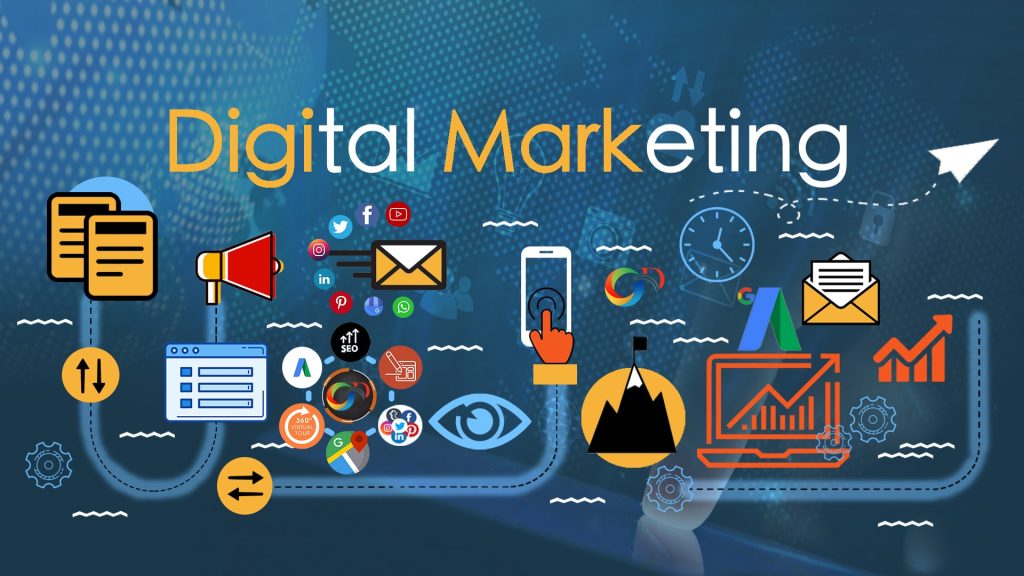
The benefits of digital marketing
Digital marketing has numerous benefits for businesses of all sizes. Here are some of the key benefits of digital marketing:
- Increased Reach: Digital marketing enables businesses to reach a wider audience through online channels. With billions of internet users, businesses can target customers from all over the world.
- Cost-Effective: Digital marketing is often more cost-effective than traditional marketing methods such as print or TV ads. Businesses can reach a larger audience with a smaller budget through digital marketing channels.
- Measurable Results: Digital marketing allows businesses to track and measure the results of their campaigns in real-time. They can easily see which campaigns are working and make changes accordingly.
- Targeted Audience: Digital marketing allows businesses to target specific audiences based on their demographics, interests, and behavior. This ensures that marketing efforts are focused on the people who are most likely to be interested in the product or service being offered.
- Increased Engagement: Digital marketing provides businesses with a range of tools to engage with their audience, such as social media, email marketing, and content marketing. This increased engagement can lead to more loyal customers and increased brand awareness.
- Competitive Advantage: Digital marketing is becoming increasingly important for businesses to remain competitive in today’s digital age. Businesses that can effectively leverage digital marketing strategies are better positioned to reach their target audience and drive growth.
- Better ROI: Digital marketing provides better return on investment (ROI) than traditional marketing methods. The ability to track and measure the results of digital marketing campaigns allows businesses to optimize their efforts for maximum ROI.
Overall, digital marketing provides businesses with numerous benefits, from increased reach and engagement to cost-effectiveness and better ROI. By leveraging the power of digital marketing, businesses can build brand awareness, attract new customers, and drive growth in today’s digital age.
Are you looking for digital marketing services contact us for the best quote- : Get Free quote Now

